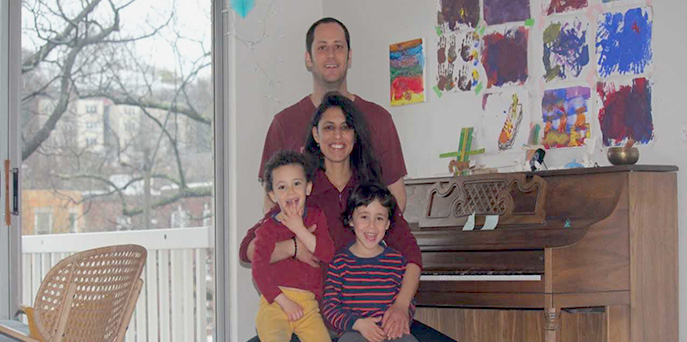Are you a journalist? Please sign up here for our press releases
Subscribe to our monthly newsletter:

“I’ve been feeling a burning need to contribute, rather than sitting idly at home. I do not have the professional training to help develop a vaccine, a drug or diagnostic tool; as a scientist, this is frustrating. So I am pursuing indirect ways to aid the battle. I contacted bodies that enable scientists to volunteer their time and skills, for instance, for the analysis of patient sample information. It is important for me to make in it known that the scientific community is engaged with the issue. This is the scientific spirit I absorbed at the Institute.”
Dr. Dan Davidi is a graduate of the Weizmann Institute of Science, who has been in Boston for about a year conducting postdoctoral research at Harvard Medical School. He has found himself quarantined with his wife and two young children in one of the global centers of the coronavirus outbreak. “Imagine throwing away a whole year’s work... Just as I was starting to gain momentum, all experiments came to a complete halt. At first, I thought about taking lab equipment home and working out of the living room. After all, I have two young technicians available, who would love to mix colorful stuff in test tubes. In the meantime, it has become clear that my postdoctoral research will take longer than planned.
That’s the big challenge here – to explain the importance of social distancing in protecting the community
“The whole process of the lockdown transpired very quickly. About a month ago, 60 patients were evacuated by bus from a hotel where there had been an outbreak to Harvard’s medical center. My wife, realizing the coronavirus had arrived, went to pick up the kids from kindergarten in the middle of the school day. Several hours later, a flood of conference and event cancellations ensued. On the following day, it was announced that the labs would close within 72 hours. Two days later, kindergartens closed. Total chaos.
“There is a difference between the Israeli community, which consumes Israeli media, and the rest of the world. Israel has been ahead of the US in almost every directive. At the same time Israelis were already staying home, flights and mass transport were still running here. I hear from my lab colleagues who have returned to their parents’ homes in other states about daily poolside parties and people who don’t get the drama of this story. That’s the big challenge here – to explain the importance of social distancing in protecting the community.
“As scientists, we understood the consequences early on: There were numerous conflicting reports, but I spoke with researchers who were working on developing a virus diagnostic kit, and they found coronavirus in samples from ‘healthy’ people, before there was any talk of the coronavirus in Boston. Everyone knew it was here, even before testing started up.
“Especially now, we feel the distance from our families and worry about loved ones in Israel. Grandparents are not a half-an-hour’s drive away, and the time differences narrow the possibility of speaking with them whenever we feel like it. But this situation also has its charm. Relocation is a family-bonding experience under normal circumstances, and now, it is even more so. We spend much more time with our children. For example, we recently saw a post on Facebook about a family that was giving away a piano – and now are all learning how to play. The kids are over the moon and have already announced they are ‘not returning to the kindergarten after the virus.’ While outside it seems like the end of the world, inside it feels like an extended summer camp.”
Dr. Dan Davidi is a fellow of the Rothschild Foundation, EMBO, and HFSP. In his doctoral dissertation at the Weizmann Institute of Science, he studied how photosynthesis can be accelerated for a greener future. He is now researching the effect of mitochondrial mutations on our cells’ function.